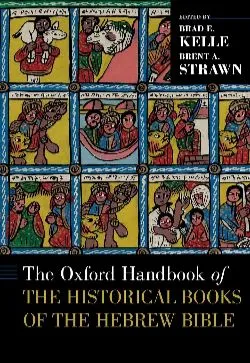
This Oxford Handbook is an interesting selection of essays by experts who write about the Historical Books of the Hebrew Bible/Old Testament. According to the Christian tradition, this is the segment from Joshua to Esther, although many of the essays in here divide (or challenge the division) of the texts into two separate histories: the Deuteronomical History (from Deuteronomy to 2 Kings) and the Chroniclers’ History (from 1 Chronicles to Nehemiah). There are two books that don’t really fit into the categorization: Ruth and Esther, which are more short stories, but fit better–respectively–into the Deuteronomical and Chroniclers’ narratives.
The essays cover a wide array of topics, from theological and historical issues to archaeological debates and reception history. I thought that the best of this text could be found entirely in the segment on reception history. It was fascinating to read about how characters such as Joshua, Deborah, Samson, Saul, David, Solomon, and Ezra have been received over the course of time. I expected to be most curious about David, but Saul’s chapter must have been the most fascinating at all.
Quite frankly, the Saul-David cycle is the most fascinating aspect of the historical books, and the narrative can be found entirely in the book (or two books) of Samuel. It’s interesting that the book is titled Samuel, at all, as he doesn’t really appear at all in the second half: he dies before Saul does, only to be called back by a necromancer (the “Witch of Endor”) and reveal Saul’s fate. 1 Samuel concludes with the death of Saul and David’s taking of the crown of the United Kingdom. I like the book of Samuel because it is honest in a way that few other texts in the Bible can possibly match: both Saul and David are praised and then excoriated by whoever authored or redacted the text. Both are the hero until they become a villain, although I think David has been received much more popularly than Saul. After all, Jesus Christ–the “Annointed One”–is depicted in a way that follows in David’s footsteps. Saul does not receive anywhere near the same respect.
The Books of Judges and Kings are also fairly balanced in fascinating ways. While Joshua is a call for genocide and total conquest of the land, Judges makes clear that this did not ever really happen. It’s a very different image of the late bronze age (or perhaps early iron age) Levant. Deborah’s heroism is praised, but Samson’s is much more complicated. The Book of Kings complicates religious belief: while Elijah and Elisha seem to be true monotheists, just about every other figure in the book is what we would classify today as “Yahwist.” Yahweh is clearly the chief god, but there is also space for the “Baals and Astartes,” the characteristically Canaanite couple ruling over the pantheon. There is something beautiful poetic in Elijah’s discovery of God not as a thunderous sound but a thin whisper: the sound of silence.
All of this is to say that I really love the Deuteronomical history, although if I could rank them from best to worst, it would be something along the lines of:
- Samuel
- Ruth
- Judges
- Deuteronomy
- Kings
- Joshua
The Chroniclers’ narrative is a totally different story. This segment was written and redacted after the Hebrews’ return from Babylon, and we can see the early makings of Second Temple Judaism. That is, Judaism. It seems almost obvious reading these texts that Yahwism and Judaism are almost two completely different religions, and it is exacerbated by the ethnonationalism found in Ezra and Nehemiah where both figures demand the divorce of all Hebrew men from Canaanite women. Although the Torah and Joshua both point in this direction, the other books of the Old Testament point to the reality of ethnic mixture. After all, Ruth is a Moabite–one of the peoples alongside the Philistines, Edomites, and Ammonites–that are set to be destroyed by the Hebrew conquest of the Holy Land. But, she also marries Boaz (a Hebrew) and David is her grandson. That means David himself is of mixed background. Ezra and Nehemiah thus represent a break from the books between Judges and Kings, and it isn’t a particularly interesting one.
I know that I’ve digressed a lot from the Oxford Handbook being reviewed here, but the only reason that I’m able to say these things at all is because I read this alongside the Historical Books in the Old Testament, and it deeply enriched my understanding. That said, some of the chapters were much better than others. For those curious, take a look.